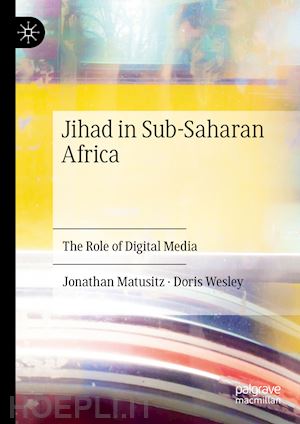

Questo prodotto usufruisce delle SPEDIZIONI GRATIS
selezionando l'opzione Corriere Veloce in fase di ordine.
Pagabile anche con Carta della cultura giovani e del merito, 18App Bonus Cultura e Carta del Docente
This book examines how jihadist groups in sub-Saharan Africa have managed to advance their extremist agenda and recruit new followers thanks to digital media fueled by the information revolution since the dawn of the 21st century. This examination is based on a mixture of historical accounts, contemporary descriptions, case studies, theoretical applications, and an in-depth applied study (in the late chapters of the manuscript). An important conclusion is that the progress of jihadism in sub-Saharan Africa has been commensurate with the development and availability of digital media. This book breaks new ground in three ways. It is the first major academic work to devote most of its content exclusively to the use of digital media by jihadist groups in that region. Examples of jihadist digital media include social networking sites, online instructional videos, propaganda videos, and online jihadist magazines?among others. Secondly, it provides detailed case studies of both well-knownAfrican groups (e.g., Al-Shabaab, Boko Haram) and lesser-known ones? e.g., the Allied Democratic Forces in the Congo (which have, nevertheless, wreaked so much damage). Lastly, it is the first book to include an in-depth thematic analysis of online jihadist magazines?Inspire, Dabiq, Rumiyah, and Gaidi Mtaani?on their content dedicated to sub-Saharan Africa.
1: Introduction.- 2. Sub-Saharan Africa.- 3. Transnational Networks in Sub-Saharan Africa.- 4. Digital Media.- 5. Jihad and Digital Media in Sub-Saharan Africa.- 6. Case Study--Al-Shabaab's Digital Media.- 7. Case Study--Boko Haram's Digital Media.- 8. Case Study--The ADF's Digital Media.- 9. Online Jihadist Magazines.- 10. Thematic Analysis of Online Jihadist Magazines.- 11. Discussion, Theoretical Implications, and Solutions.
Jonathan Matusitz, Ph.D., is currently an associate professor in the Nicholson School of Communication and Media at the University of Central Florida. He is author of many scholarly books, including Global Jihad in Muslim and non-Muslim Contexts (Palgrave Macmillan, 2020), and From Child Terrorism to Peace Activism (Springer, 2022).
Doris Wesley, M.A., is currently a researcher and doctoral fellow in the Communication, Rhetoric, and Digital Media program at North Carolina State University. She has published peer-reviewed articles in journals such as the International Gender Research, the Journal of Communication and Media Research, the Western Journal of Communication, and Mobilities.











Il sito utilizza cookie ed altri strumenti di tracciamento che raccolgono informazioni dal dispositivo dell’utente. Oltre ai cookie tecnici ed analitici aggregati, strettamente necessari per il funzionamento di questo sito web, previo consenso dell’utente possono essere installati cookie di profilazione e marketing e cookie dei social media. Cliccando su “Accetto tutti i cookie” saranno attivate tutte le categorie di cookie. Per accettare solo deterninate categorie di cookie, cliccare invece su “Impostazioni cookie”. Chiudendo il banner o continuando a navigare saranno installati solo cookie tecnici. Per maggiori dettagli, consultare la Cookie Policy.